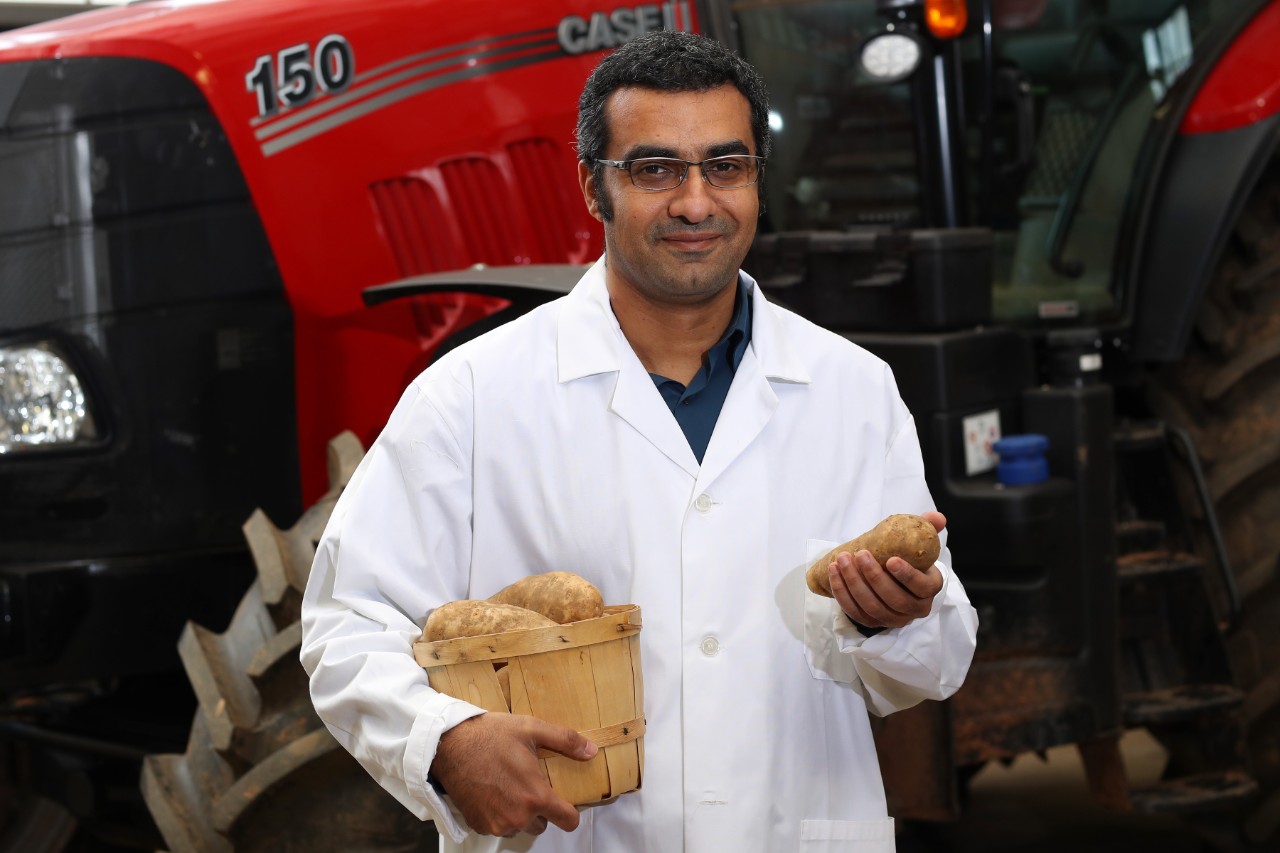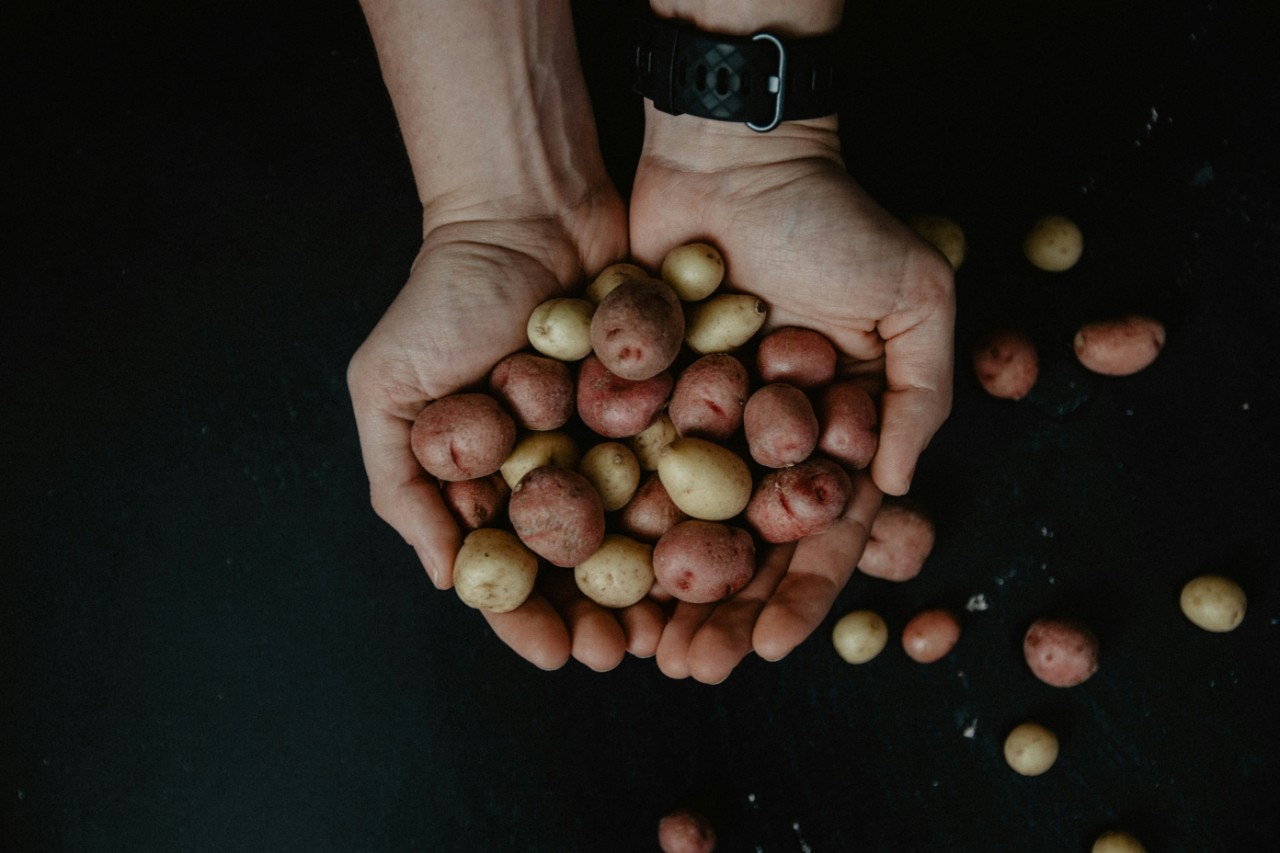Posted: May 16, 2024
By: Christena Copeland
For Giving Power
McCain Foods and Potatoes New Brunswick renew Dalhousie’s prestigious McCain Research Chair, extending their commitment to food security.
At Dalhousie, sustainability is woven into every aspect of campus life—from teaching and learning to infrastructure development to groundbreaking research. The university’s longstanding relationship with McCain Foods has been critical to its efforts concerning sustainable agriculture.
In 2018, a transformational investment from Potatoes New Brunswick and McCain Foods allowed Dalhousie to hire Dr. Ahmad Al-Mallahi—a renowned expert in agricultural engineering and sensing technologies—as its McCain Research Chair. The goal of Dr. Al-Mallahi’s research was to develop machines and equipment with precise operations to optimize farm output while producing food.
“After five years, we created three projects that have resulted in prototypes that were deployed in the field and demonstrated to key stakeholders,” says Dr. Al-Mallahi. “In fact, consistently demonstrating our developments proved to be very effective in showing the actual applicability of the research in the field. Developing a solution means that each one of these projects is presented in plug-and-play mode or with clear instructions on how to use the solution as a user, not as a developer.”
The project and partnership have proven to be so successful that McCain Foods and Potatoes New Brunswick have dug in for an additional five years of support.
 Dr. Ahmad Al-Mallahi. (Submitted photo)
Dr. Ahmad Al-Mallahi. (Submitted photo)
Partnering for transformational change
As Dalhousie moves into its most ambitious fundraising campaign to date, it is bringing worlds together by partnering with stakeholders who believe in the power of high-impact research to advance food security. In keeping with the United Nations' Sustainable Development goal to end hunger, achieve food security, improve nutrition, and promote sustainable agriculture, this partnership with McCain Foods and Potatoes New Brunswick is tackling an issue that has far-reaching impacts on our communities.
“The development and implementation of new technological solutions designed to support regenerative agriculture in potato cropping systems offer a promising way forward,” explains Matt Hemphill, executive director of Potatoes New Brunswick. “These solutions can encompass a wide range of innovations, including precision agriculture tools, data analytics, and agri-tech applications tailored to the specific needs of potato farmers. By combining the principles of regenerative agriculture with cutting-edge technology, we can optimize resource utilization, reduce waste, and foster the health of our soils, all of which are essential for the long-term success of potato farming in our province.”
Regenerative agriculture seeks to create farming systems that are not only productive and profitable, but also environmentally sustainable and resilient in the face of ongoing challenges such as climate change and soil degradation. Potatoes are the premier vegetable crop in Canada, with $1.5 billion nationwide in potato receipts in 2021. The agricultural significance of potatoes is particularly prominent in provinces like New Brunswick, the home of McCain Foods—the world’s largest potato processor.
Sustainable agriculture as a key component of food sustainability
McCain Foods has had a view to sustainable agriculture for decades, ensuring that every potato used in their products comes from farms practicing regenerative agriculture. Three years ago, they launched the Farms of the Future initiative, which aims to revolutionize farming by combining advanced research with regenerative practices. The McCain Research Chair represents a shared vision of advancing sustainable potato farming.
“We are both pleased and impressed by the work of Dr. Al-Mallahi and his team," says Dr. Yves Leclerc, McCain Foods’ global director of agriculture sustainability. "Potatoes are our passion, and regenerative agriculture stands as a primary focus for both me and McCain Foods, in light of the numerous challenges confronting the agricultural industry. It is only by working together to build an industry-aligned solution that we can truly transform our agricultural production system."
Inspiring future-ready leaders
Dr. Al-Mallahi and his team have also achieved notable success in training the regenerative agricultural leaders of the future by assembling a cohort of four PhD students, four masters students, one postdoctoral fellow, and 13 undergraduate interns. Their research endeavours have resulted in the publication of twelve research articles, including one honoured with the prestigious 2023 IC-IMPACTS HQP Research Paper Award in the theme of food security.
Additionally, they have initiated the process for three patent applications, with progress toward commercialization. Their work has garnered international recognition, notably through an article in The Conversation Canada, which has sparked interest in their innovative nutrient-sensing technology.
That’s why the McCain Research Chair is a shining example of how Dalhousie is working to solve the problems of our time—not make peace with them. The collaboration between Dalhousie, McCain Foods, and Potatoes New Brunswick demonstrates the pivotal role philanthropy plays in finding solutions and advancing outcomes.

